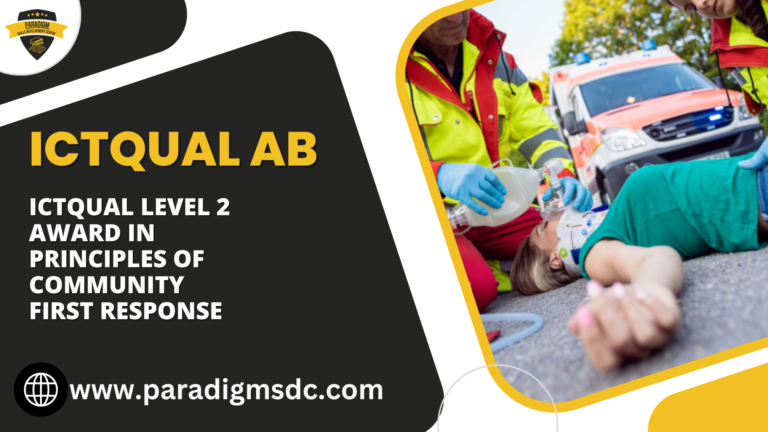Course Introduction
The ICTQual ISO/IEC 27035 Information Security Incident Management Internal Auditor Course focuses on the principles and practices of auditing information security incident management processes. Based on the ISO/IEC 27035 standard, which provides guidelines for incident management, this course covers how to audit processes to ensure they are compliant, effective, and capable of managing and mitigating information security incidents.
Course Overview
This course provides an in-depth exploration of auditing information security incidents, from initial detection and reporting to response and recovery. Participants will learn how to assess incident management practices within an organization, ensuring they adhere to international standards and effectively address potential vulnerabilities and threats.
Key aspects of the course include:
- Understanding ISO/IEC 27035: A detailed examination of the standard’s requirements and best practices for information security incident management.
- Internal Audit Principles: Fundamentals of auditing, including planning, conducting, and reporting on internal audits.
- Incident Management Processes: How to evaluate incident detection, reporting, response, and recovery procedures.
- Risk Assessment: Techniques for assessing the risks associated with information security incidents and evaluating the effectiveness of management controls.
Course Study Units
- Introduction to Information Security Incident Management
- Fundamentals of Internal Auditing
- ISO/IEC 27035 Standard Overview
- Incident Detection and Reporting
- Incident Response and Handling
- Incident Investigation and Analysis
- Incident Communication and Coordination
- Reporting and Follow-Up
- Incident Recovery and Remediation
Learning Outcomes
Upon completing the ICTQual ISO/IEC 27035 Information Security Incident Management Internal Auditor Course, participants will be able to:
- Introduction to Information Security Incident Management
- Understand the basic principles, concepts, and objectives of information security incident management.
- Identify the importance of effective incident management in protecting organizational information assets.
- Appreciate the role of incident management in maintaining operational resilience and minimizing business impact.
- Fundamentals of Internal Auditing
- Define the roles and responsibilities of internal auditors in assessing information security incident management processes.
- Apply auditing techniques to evaluate the effectiveness of incident management controls.
- Demonstrate knowledge of internal auditing standards and best practices applicable to incident management.
- ISO/IEC 27035 Standard Overview
- Interpret the requirements and clauses outlined in the ISO/IEC 27035 standard for information security incident management.
- Align incident management practices with ISO/IEC 27035 principles and guidelines.
- Establish incident management processes and procedures in accordance with ISO/IEC 27035 standards.
- Incident Detection and Reporting
- Implement techniques and tools for detecting information security incidents promptly and accurately.
- Develop procedures for incident reporting, ensuring timely and comprehensive documentation.
- Enhance incident detection and reporting capabilities to minimize response times and mitigate impact.
- Incident Response and Handling
- Develop incident response plans and procedures to address security incidents effectively.
- Coordinate response efforts across organizational teams to contain and mitigate incidents.
- Execute incident handling processes in alignment with predefined roles, responsibilities, and escalation procedures.
- Incident Investigation and Analysis
- Conduct thorough incident investigations to identify root causes, impacts, and contributing factors.
- Analyze incident data and evidence to derive insights and inform remediation efforts.
- Apply forensic techniques and methodologies to support incident analysis and attribution.
- Incident Communication and Coordination
- Establish communication channels and protocols for incident notification, escalation, and coordination.
- Foster collaboration among internal and external stakeholders to facilitate effective incident response.
- Ensure clear and timely communication throughout the incident lifecycle to maintain transparency and manage expectations.
- Reporting and Follow-Up
- Prepare comprehensive incident reports documenting findings, analysis, and remediation actions.
- Initiate follow-up activities to monitor the implementation of corrective actions and improvements.
- Ensure compliance with reporting requirements and regulatory obligations in incident management processes.
- Incident Recovery and Remediation
- Develop incident recovery plans and strategies to restore affected systems, data, and services.
- Implement remediation measures to address vulnerabilities and prevent recurrence of security incidents.
- Evaluate the effectiveness of incident recovery and remediation efforts in restoring normal business operations and mitigating future risks.
Course Benefits
- Enhanced Skills: Gain specialized skills in auditing information security incident management processes.
- Compliance Assurance: Ensure that your organization’s incident management practices meet international standards.
- Improved Incident Response: Contribute to more effective and efficient incident management and response strategies.
- Career Advancement: Position yourself as a qualified internal auditor with expertise in information security incident management.
- Organizational Value: Help your organization strengthen its information security posture and resilience.
Who Is This Course For?
The ICTQual ISO/IEC 27035 Information Security Incident Management Internal Auditor Course is ideal for:
- Internal Auditors: Professionals who conduct audits within their organizations and seek to specialize in information security.
- Information Security Managers: Those responsible for overseeing and managing information security incident response and recovery.
- Compliance Officers: Individuals tasked with ensuring organizational practices adhere to regulatory and standard requirements.
- IT Professionals: Staff members involved in information security who wish to enhance their auditing skills and knowledge.
Future Progression
After completing this course, participants may pursue further qualifications and career development opportunities, including:
- ISO/IEC 27001 Lead Auditor Course: For those looking to become lead auditors in information security management systems.
- ISO/IEC 27035 Lead Auditor Course: Specialize further in incident management and lead audits in this area.
- Advanced Information Security Certifications: Explore additional certifications in information security management, risk management, and cybersecurity.
The ICTQual ISO/IEC 27035 Information Security Incident Management Internal Auditor Course provides a robust foundation for auditing incident management processes, ensuring organizations are well-prepared to handle information security incidents effectively and in compliance with international standards.







